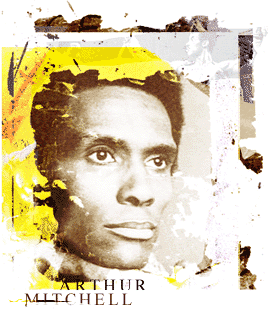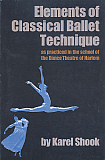
The Dance Theatre of Harlem
Biographies of the founders
Arthur Mitchell

"A Political Activist Through Dance" -Arthur Mitchell (regarding himself)
Arthur Mitchell was born in New York City on March 27, 1934. He grew up in a Harlem neighborhood and says that education was the main factor that saved him from becoming a gang member like many others growing up in his neighborhood. Mitchell recieved a scholarship for the High School of Performing Arts in New York City with his performance of "Steppin' Out with My Baby." There he became the first male to ever win the prestigous Annual Dance Award. He says that it was during his time at the School of Performing Arts that he realized that he was "in service to a force greater than [himself], and that was [his] art form, dance." It was also at the school however that he first encountered the effect of racism in the dance world, where less qualified and talented white students were chosen for parts over him. After graduating he was recieved another full scholarship at age eighteen, this time to the famous School of American Ballet. In 1955 he joined the New York City Ballet in another ground breaking move, and became the first African-American male to be a permanent member of a ballet company. He remained with the New York City Ballet for fifteen years, where he quickly rose to the position of prinicpal dancers and awed and inspired many audiences with his dances, many of which were choreographed on him. During this time Mitchell also performed in other various venues, including broadway, television, and movies. It was upon the death of Martin Luther King, Jr. that Mitchell decided to to something for the children in Harlem. I wanted to provide an oppurtunity for them that he felt like he had been given, and that had saved him. He began teaching in Harlem in 1968, and in 1969 with financial assistance and the help of his mentor Karel Shook, the Dance Theatre of Harlem was founded.
Karel Shook

"...diverse elements of different heritages and cultures can find a natural place in the serene realm of the arabesque and the entrechat."
Karel Shook was not only Arthur Mitchell's mentor, but also the co-founder of the Harlem Dance Theatre. He was born in 1920 in Renton, Washington. His career in the performing arts began in Washington when he pursued the acting with the Seattle Repertory Theatre. By age 13, he was already receiving recognition for his sucess such as a scholarship to the Cornish School of Allied Arts. It was at this school that he was first exposed to ballet. His career began to focus solely on dance when he joined companies such as Ballet Russe de Monte Carlo, participated in Broadway musicals, and danced with the New York City Ballet. Eventually, in 1952, he settled into a faculty position with the Katherine Dunham school. However, when the school closed down, he was ready and able to create a school of his own called the Studio of Dance Arts. His pupils taught at his new school are now some of the most prestigious African American dancers and choreographers today. Shook became a staff member of the June Taylor School in 1957. Thereafter word of his success continued to spread. He was then invited to become the first teacher and ballet master at the Dutch National Ballet. While he was in the Netherlands, he also pursued a writing career in which he published several articles, and poems in reference to his experience as an African American in the ballet world. Shook also choreographed 24 pieces for the stage, opera, and even film. and television. He remained in the Netherlands for nine years before returning to the US in 1968. This was when he began his relationship with Arthur Mitchell, and eventually became the co-director and founder of the Dance Theatre of Harlem. His success with this new company inspired him to write a book, which was published and considered a success as well. Unfortunately, Karel Shook passed away in 1985, however, the company that he directed as his final project continues to grow and prosper in its many accomplishments.
AADH Home | History | Biographies | Bibliography | E-mail